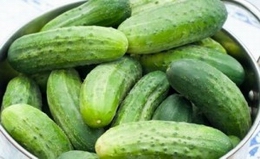 The Centers for Disease Control and Prevention (CDC) announced Thursday that a multi-state Salmonella outbreak was likely caused by the consumption of cucumbers imported from Mexico. The announcement came one day after USA Today reporter Liz Szabo reported that the FDA would be conducting 18 percent fewer food inspections this year due to a loss of funding and that “even before the sequester, the FDA was able to inspect less than 2 percent of all food imports.”
The Centers for Disease Control and Prevention (CDC) announced Thursday that a multi-state Salmonella outbreak was likely caused by the consumption of cucumbers imported from Mexico. The announcement came one day after USA Today reporter Liz Szabo reported that the FDA would be conducting 18 percent fewer food inspections this year due to a loss of funding and that “even before the sequester, the FDA was able to inspect less than 2 percent of all food imports.”According to the CDC, at least 73 people fell ill with Salmonella serotype Saintpaul infections between January and April of this year after eating cucumbers. On April 24, the U.S. Food and Drug Administration placed two Mexican import firms on an “import alert,” stating that cucumbers from the farms would be denied admission into the U.S. unless the suppliers were able to prove the produce was free of Salmonella.
People started falling ill with Salmonella infections before the Sequester, so there’s no question that these cucumbers made it into our food supply even before cuts to food inspection. When the funding cuts are in full effect, will we see even more outbreaks from both imported and home-grown food?
I shudder at the thought of what these cuts will truly mean in terms of the safety of our food supply.
The USDA’s Microbiological Data Program (MDP), which used to conduct 80 percent of all federal produce testing for pathogenic bacteria, officially shut down on December 31, 2012.
Would MDP have discovered contamination on cucumbers before they got to market?
We may never know—and we may think of cucumbers as fairly benign since they’re not linked to food safety problems as often as leafy greens or melons, but this outbreak demonstrates that all fresh produce poses a food safety threat and cuts to federal programs may already be having an impact.





